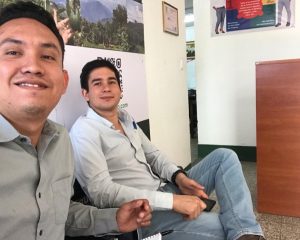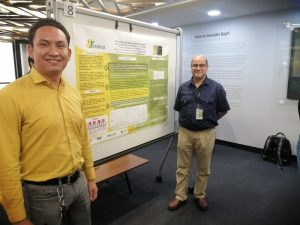By Francisco del Cid
The ASPIRE Research Assistantship pilot project with industry has come to a successful conclusion. One of the Research Assistants, Brayan Daniel Hernández, a student of Industrial Technology Engineering at the Universidad del Valle de Guatemala (UVG) South Campus, participated in this pilot project with the company FRUTESA, from the Peas and Vegetables commission of AGEXPORT’s agricultural sector. ASPIRE is pleased to share a few of the valuable lessons and key moments from Bryan’s experience.
The goal of the research project was to develop a proposal to improve the administrative process management system using the DMAIC process, which would in turn improve synergy within the departments of Frutas Tropicales de Guatemala S.A (FRUTESA). The DMAIC process is a methodology that analyzes a problem in five different stages: define, measure, analyze, implement, and control. It becomes an effective cycle for process improvement.
While Brayan was working on his project, he received job offers from the company to continue with his research after the pilot phase ended. Given that FRUTESA was pleased with Brayan’s work and wanted him to stay, and he, too, enjoyed the work, he accepted their offer.
The final results of the project included an analysis of FRUTESA’s payroll process and recommendations to improve it; a proposal for improving the purchasing process by reducing the purchase order timeline by one day; and the analysis of the traceability of avocado inventory in the production process and a proposal to improve it. Traceability refers to the ability to identify at each stage of the process, the amount of inventory used and the destination, which may be the finished, reprocessed, or discarded product.
Throughout the progression of the project, Brayan determined that it was necessary for him to reinforce certain areas of his own knowledge, and with the support of UVG, was able to enroll in Coursera courses, obtaining a certificate for two courses in the areas of Six Sigma and Excel.

Brayan Hernandez and Rodrigo Aragón, ASPIRE researcher at Frutesa offices. Photo: Brayan Hernandez
Throughout the pilot, the importance of active participation from Brayan and the company was apparent, helping to clearly define the objectives of the project, committing time and other resources to support the student, in addition to understanding the limitations of the project.
They learned that students should be consistent and persevere when faced with challenges because difficulties may arise at any point in the project that test one’s strength and motivation. Anxiety can work against students, but learning how to face and conquer those challenges fosters a stronger, more mature student and experience. Brayan is a student who rose above the challenges and demands, delivering the best possible results.
Brayan considers ASPIRE to have played a fundamental role in completing his academic training, becoming a part of his identity as a student, with such notable highlights as participating in the scientific poster competition at the II Scientific Congress for Peace and Development, as well as attending the ASPIRE 2023 Research and Development Symposium for innovation at AGEXPORT.

Brayan Hernández and Francisco del Cid, ASPIRE researcher, at the II Scientific Congress for Peace and Development. Photo: Brayan Hernandez
Measuring one’s impact on a project can be tough; considering the number of people involved, increases in efficiency, process improvements, new products, etc. can all be taken into account. All of these results are effected by individuals. And within this particular project, carried out by an individual student, his significant impact is clear, resulting in a relationship of trust between the student and his researcher, not only in the professional field but also in the personal field, creating spaces to share life experiences and personal advice.
It is gratifying to see a project end successfully. Seeing an outcome with so many improvements and learning opportunities taking place, reaffirms the value of so many collective efforts and diverse contributors who were part of this challenge. ASPIRE is an opportunity to generate value in projects that integrate different sectors of society such as academia, business, and communities. Being part of an improvement project in any area of the industry, impacts its overall efficiency and promotes economic growth, which in turn benefits the sector and its community as a whole.
About ASPIRE
The ASPIRE Project is a five-year, $15 million project funded by USAID and implemented by the Massachusetts Institute of Technology (MIT), Universidad del Valle de Guatemala (UVG), and the Guatemalan Exporters Association (AGEXPORT), with the goal of creating a world-class, replicable model for how Latin American universities, in collaboration with the private sector, government, and local communities, can respond to local and regional development needs. The project implements a collaborative approach to research, teaching, innovation, entrepreneurship, and tech transfer, based on the combination of local assets and knowledge with MIT’s experience in the innovation ecosystem.